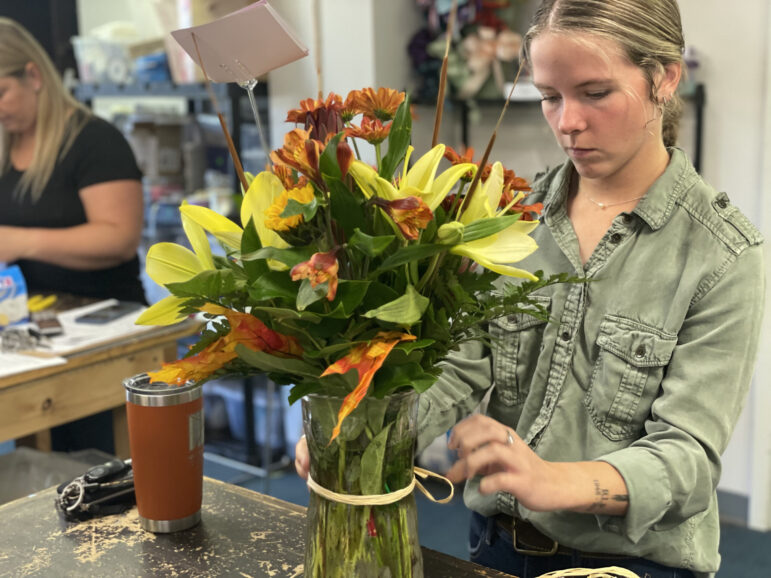By MIRANDA DUNLAP
Capital News Service
LANSING — Inside Wild Strawberry and More, a sweet floral scent lingers in the air.
An occasional rustling of flowers cuts through the otherwise heavy silence. In the corner, a woman gently ties a ribbon around a vase overflowing with flowers.
The Holt florist shop’s current experience is not without lingering difficulties from the pandemic, a situation confronting other florists across the state.
The store closed in February 2020, and manager Crystal Hunter said the shop couldn’t do business because it couldn’t receive merchandise to sell.
“We didn’t have inventory in our flower coolers,” she said. “Our flowers come out of Cleveland, Ohio. It was difficult to get our shipments across those state lines.”
When the store reopened in May 2020, it offered only deliveries and curbside pickup.
“We were still super low on staff numbers,” Hunter said. “We were trying to be really safe about keeping the staff as healthy as possible and eliminating the virus from taking us down again because there were only two of us (working) at that time.”
Hunter said business has increased since the doors reopened.
“We have been super busy now,” she said. “People want to send flowers to people that they can’t see. They want to send them to the elderly and a lot of people who are hospitalized.”
The business still faces supply chain problems, and Hunter said the possibility of not having enough inventory to fulfill orders is scary.
“We can’t get vases, we can’t get floral paints and even some of our flowers,” she said. “There are no workers in the fields to pick the flowers, and there’s no transportation to get it to us.
“Everything is getting nerve-racking.”
Hunter said it was initially difficult to hire staff while unemployment benefits were still available. Now more people are willing to work, she said, but irregular hours are deterring potential employees.
“We have fickle days out of nowhere,” Hunter said. “It’s so fickle that it’s hard to maintain good schedules for people.
“We’re trying to keep people busy and scheduled and not feel like you’re jerking them around by being like, ‘Come in today, don’t come in today, leave early,’” she said.
Hunter said all employees wear “multiple hats” to keep things running smoothly, with each designing arrangements, keeping the building in shape, running social media accounts and communicating with customers.
“We’re all trying to be flexible and all trying to keep our mental health intact while going through a lot of these changes,” she said.
Hunter’s trouble with staffing and inventory is echoed throughout the state.
Ashley Myers, the owner of the Coop Floral Shop in Cheboygan, has also labored to hire more employees during the pandemic.
“I have an employee and I’m struggling to find another one,” she said. “There’s been many late nights and early mornings.”
Myers has also experienced inventory problems, especially with being able to purchase vases. She said that’s caused her to spend more money on goods that she wouldn’t normally purchase to fulfill orders.
“Right now we’re just losing money,” she said. “I have not raised prices at this point, but it is something that we’re in the process of looking into.”

Miranda Dunlap
Inside Wild Strawberry and More, a florist shop in Holt, delivery driver Jessa Powers ties a ribbon around a floral arrangement. Powers has taken on more responsibilities as the business has adapted to the pandemic.Rod Crittenden, the CEO and executive vice president of the Great Lakes Floral Association based in Meridian Township, said that Michigan florists are selling more flowers right now than they have in the association’s history.
“We’ve had a huge boom,” he said. “It’s been a really good, positive thing for the floral industry.”
He said that there were problems in March 2020, when nonessential businesses were shut down.
Many flowers were wasted during that time, but he said that the industry bounced back, and floral inventory isn’t the main problem for florists.
“Flowers are an interesting business,” he said. “It’s a perishable item, so we’re constantly moving product. It all happens very fast, which makes our industry very unique. From that standpoint, we haven’t had a lot of supply chain issues.”
Teresa Cytlak is the president of the Floral Association and owns Ridgeway Floral and Gifts in Three Rivers. She’s had the shop for 35 years.
Cytlak said that her sales are doing great, but she also struggles with getting shipments of “hard goods” like vases and arrangement accessories.
“People are having issues with glassware,” she said. “If you find it, you’re going to be on a waiting list.”
Cytlak also has had trouble hiring employees for the past three years..
Cytlak said that the association is combatting the staffing shortage at the state level by providing education and scholarships to people who are interested in becoming florists. It offers classes to anyone who wants to become a certified florist or learn about floral design.
However, having a small staff and being short of some products doesn’t stop her from meeting customer needs.
“Florists are pretty creative and resourceful people,” she said. “We have adapted well to the new way we’re having to think, like, ‘okay, I can’t get this, what can I do to improvise?’”
Cytlak sees the current situation as a “creative challenge” for the industry.
“We really do love the challenge,” she said. “Even though it’s hard work, we come back every day thinking, ‘today’s a good day, let’s go at it.’”